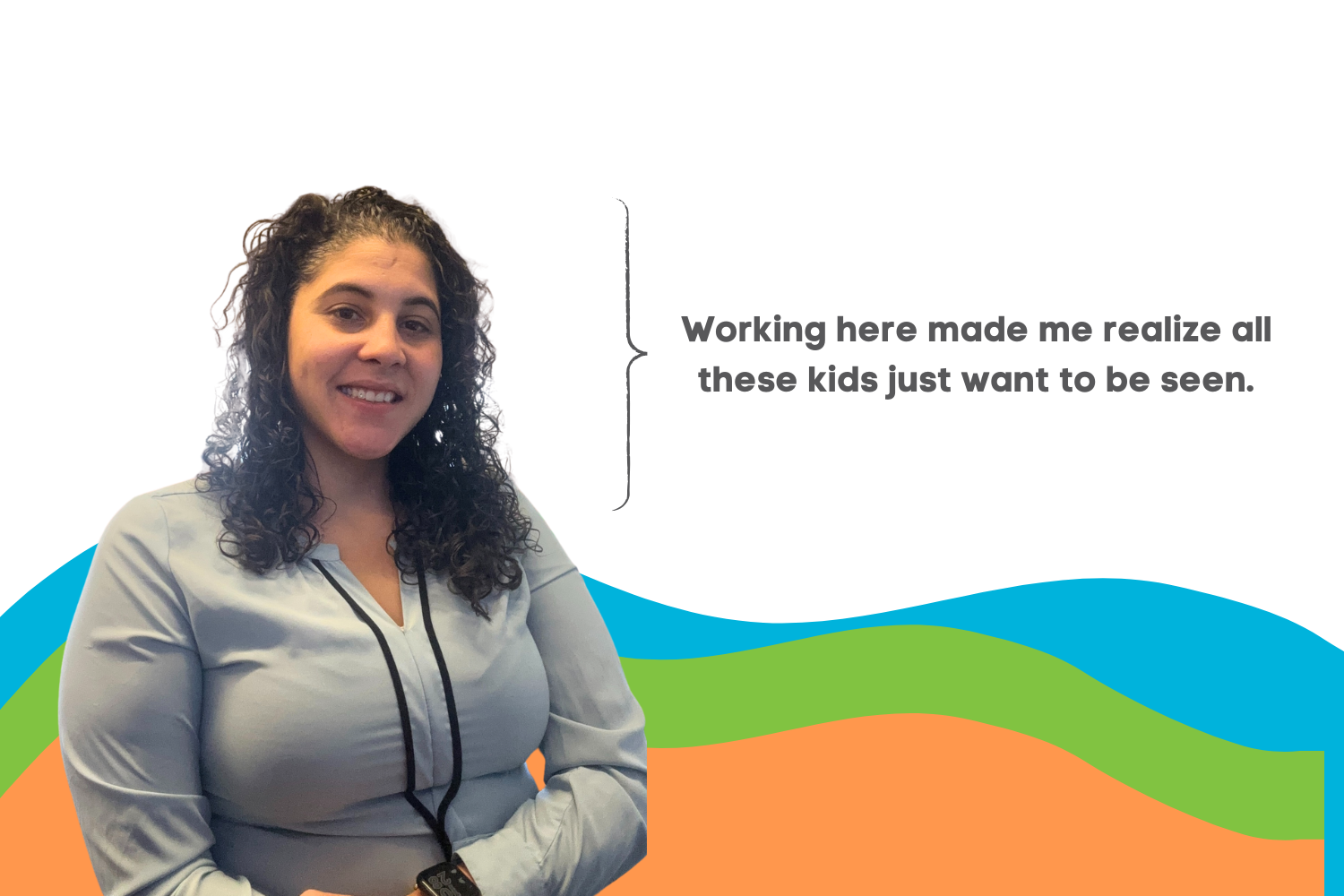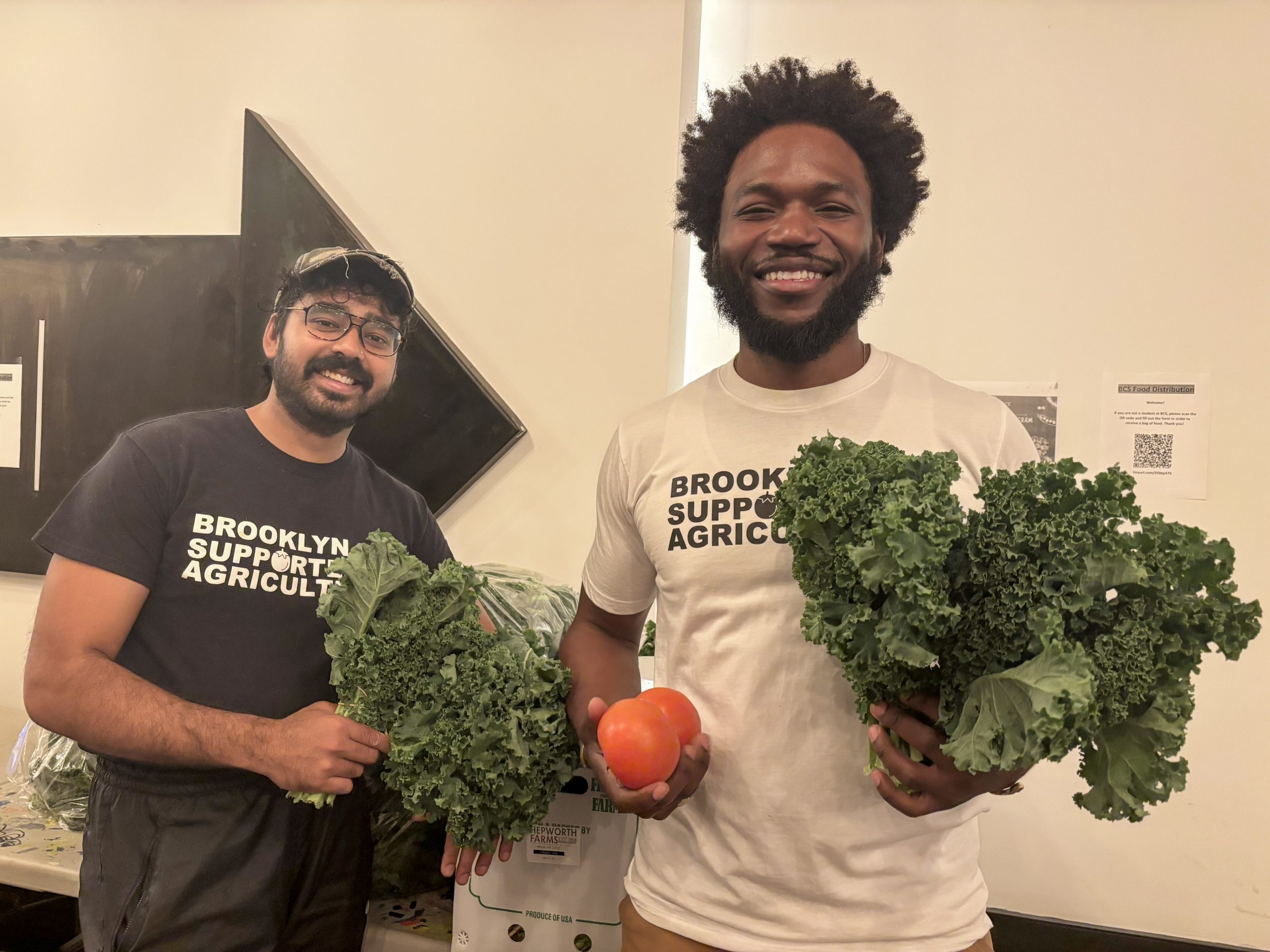Staff Spotlight: Davina Galindez, BHSLCS

What’s your position here at Brooklyn High School for Leadership and Community Services?
I’m an advocate counselor and, as of this year, I’m the Senior Advocate Counselor because I’ve been here the longest. I’ve been [at BHSLCS] for a year and a half now, but I’ve been an advocate counselor since 2020.
What made you want to go into this field?
I have my degree in social work, and I always wanted to be the person that I needed when I was younger. You know how you go to school, but people don’t really see you? Working here made me realize all these kids just want to be seen. I’m like, “Okay, let me make sure I know the loud ones,” and I make sure I know the quiet ones, too. I make sure I know the ones that don’t want to be known.
If you don’t have a relationship with the kids, there is no way you’re going to be able to help them with their grades or even hold them accountable because they’ll want to attack you. But if you have that relationship with them, you talk to them on a daily basis, and you know what’s going on in their life, then you’ll be more comfortable, like, “Hey, I haven’t seen you in three weeks. What’s going on?” Then you can engage in a conversation. You want them to be able to talk to you and feel comfortable and trust you.
What else does being an advocate counselor entail?
We meet with [the students]. We do attendance outreach because this is a transfer high school, and our attendance is kind of low. We make sure we call them and say, “Good morning. Are you coming in today? Where are you? What’s going on?”
How many students do you work with at one time?
I work with the whole school, but my caseload is about 52 kids. It’s hard, but once you build that relationship, it becomes like second nature. Like, “Oh, that’s John. John comes to school at 9:30 because he has to go drop off his sister and brother first.” So then, with him, I won’t fight. I won’t be like, “You have to be here at 8:20” because I know he has other responsibilities. So the conversation will be like, “Alright, you’re here at 9:30, so you’re missing first period. So, what we’re going to do is reach out to the first period and make a plan with your first period teacher, because you will be missing.” Sometimes I’ll call their parents to see if we can try to figure out a different pick up/drop off situation. But if we can’t, we’ve just got to meet them where they are and help them.
A lot of these kids’ parents–they’re tired, so then the kids have to do more at home, and that leads to attendance problems. The good thing about our school is that sometimes we offer online classes. For example, I have a student now who needs to work because her mom’s making her pay rent, but her schedule kind of keeps her from coming to school. So, I made a plan with her to come in twice a week. During those two days, we’re gonna get everything she needs, and our school does tutoring in the evenings, so we’re making sure she joins the tutoring. She still does what she has to do, even though she’s not always coming into the building. Then eventually, we’ll say, “Talk to your job. See if you could switch your schedule up.” We just try to do a whole bunch of different things to make it a good fit for the kid.
Are you also helping students prepare for careers and/or college?
Yes, so I usually have two meetings with them a month. In both meetings, we’re going to look at their grades. We’re going to hold them accountable. We’re going to look at attendance. If we see that they’re getting into any issues with other students, we will address those situations. They have the opportunity to talk about whatever it is that’s going on in their life.
Then, for the second one, we have a career meeting: “So what do you want to do after high school? What kind of trades do you want to do if not college (because college isn’t for everyone)?” Or even if they want to take a break before they go to college. We’ll say, “Well, what are we going to do in that break? What programs can we get you in? Can we help you with your resume? Help you get a job?” We also have a Learn to Work program, and that’s the internship program. We try to get all the kids involved in that program so when they graduate, at least they have a resume.
What are some of your favorite things about the job?
My favorite thing is just interacting with the kids and seeing them when they first come in. When they graduate, it’s a big difference. I had kids that just weren’t coming to school or they were getting in fights every day, but then that senior year, you see the growth in them. They’ve gotten their stuff together; they’ve matured. Also, if they need therapy outside of school, we connect them with therapy. Something I started with the principal is that whenever my friends give away their clothes and stuff, I’ll bring clothes in here and we’ll give the kids donations. A lot of them get taken, and they’re very appreciated. Just knowing that I can help someone makes me feel amazing.
It seems like you’re really looking out for them, even beyond the classroom.
Yeah, I used to work in the homeless shelter for teenagers, so I feel like I’ve seen the full circle because a lot of the teenagers in the shelter end up in transfer schools. When I met with kids who were in the shelter, I used to make sure, like, “Do you have health insurance? Do you have any legal issues you need help with? Do you have an ID?” I brought that into this work with me. So when I have that initial meeting with a student, I’m asking, “When was the last time you went to the dentist? When’s the last time you saw a GYN? Are you taking care of yourself?” Then they see, “Oh, she cares about me outside of school, so let me put a little bit of work in. Let me listen to her and see if I could have a different outcome.”
What are some of the challenges you face on a day-to-day basis?
We’re a high school, so kids fight. It’s not a lot, but when it does happen, that can be tough because it’s a lot of strong, strong feelings from both sides.
Do you sit down and talk with the students involved in fights?
We have a re-entry meeting. If someone fights and gets suspended, they have to meet with us before we can let them out in the community. We just talk about coping mechanisms, or say, “You’re gonna be in this school with the kid you’ve just fought with. What are some things we can do so you guys don’t fight again?” A lot of our kids have trauma, too, so sometimes they’re not ready to talk to you, and that’s a little frustrating just knowing that you can’t really help them at that moment. Because no matter how much we want to help these kids, we can’t help them unless they want to receive the help. It can also be tough if you help this kid and they end up not graduating. That’s a little frustrating.
What happens then?
Then they just stay another year; they have until age 21. If I see that they have a little bit of credits and they’re about to be turning 21, I’ll start bringing up the GED conversation, and I’ll tell them, “A GED is just like a high school diploma but on your time.” I’ll walk them over to the GED place. I’ll sit with them, with the counselor, and just be with them the whole way through so they can feel comfortable doing it.
Top Viewed Posts
Youth Art Programs
Program Spotlight: Day Habilitation
BCS Volunteers Spring into Action for Brooklyn
Recent News

Participant Spotlight: Ann Salmon, PROS
July 16, 2025
Read More
 SUBSCRIBE
SUBSCRIBE 











